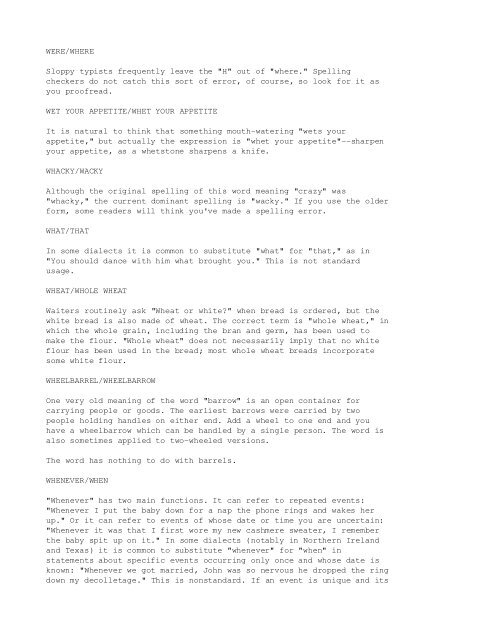Common_Errors_in_English_usage
Common_Errors_in_English_usage
Common_Errors_in_English_usage
Create successful ePaper yourself
Turn your PDF publications into a flip-book with our unique Google optimized e-Paper software.
WERE/WHERE<br />
Sloppy typists frequently leave the "H" out of "where." Spell<strong>in</strong>g<br />
checkers do not catch this sort of error, of course, so look for it as<br />
you proofread.<br />
WET YOUR APPETITE/WHET YOUR APPETITE<br />
It is natural to th<strong>in</strong>k that someth<strong>in</strong>g mouthwater<strong>in</strong>g "wets your<br />
appetite," but actually the expression is "whet your appetite"sharpen<br />
your appetite, as a whetstone sharpens a knife.<br />
WHACKY/WACKY<br />
Although the orig<strong>in</strong>al spell<strong>in</strong>g of this word mean<strong>in</strong>g "crazy" was<br />
"whacky," the current dom<strong>in</strong>ant spell<strong>in</strong>g is "wacky." If you use the older<br />
form, some readers will th<strong>in</strong>k you've made a spell<strong>in</strong>g error.<br />
WHAT/THAT<br />
In some dialects it is common to substitute "what" for "that," as <strong>in</strong><br />
"You should dance with him what brought you." This is not standard<br />
<strong>usage</strong>.<br />
WHEAT/WHOLE WHEAT<br />
Waiters rout<strong>in</strong>ely ask "Wheat or white?" when bread is ordered, but the<br />
white bread is also made of wheat. The correct term is "whole wheat," <strong>in</strong><br />
which the whole gra<strong>in</strong>, <strong>in</strong>clud<strong>in</strong>g the bran and germ, has been used to<br />
make the flour. "Whole wheat" does not necessarily imply that no white<br />
flour has been used <strong>in</strong> the bread; most whole wheat breads <strong>in</strong>corporate<br />
some white flour.<br />
WHEELBARREL/WHEELBARROW<br />
One very old mean<strong>in</strong>g of the word "barrow" is an open conta<strong>in</strong>er for<br />
carry<strong>in</strong>g people or goods. The earliest barrows were carried by two<br />
people hold<strong>in</strong>g handles on either end. Add a wheel to one end and you<br />
have a wheelbarrow which can be handled by a s<strong>in</strong>gle person. The word is<br />
also sometimes applied to twowheeled versions.<br />
The word has noth<strong>in</strong>g to do with barrels.<br />
WHENEVER/WHEN<br />
"Whenever" has two ma<strong>in</strong> functions. It can refer to repeated events:<br />
"Whenever I put the baby down for a nap the phone r<strong>in</strong>gs and wakes her<br />
up." Or it can refer to events of whose date or time you are uncerta<strong>in</strong>:<br />
"Whenever it was that I first wore my new cashmere sweater, I remember<br />
the baby spit up on it." In some dialects (notably <strong>in</strong> Northern Ireland<br />
and Texas) it is common to substitute "whenever" for "when" <strong>in</strong><br />
statements about specific events occurr<strong>in</strong>g only once and whose date is<br />
known: "Whenever we got married, John was so nervous he dropped the r<strong>in</strong>g<br />
down my decolletage." This is nonstandard. If an event is unique and its





